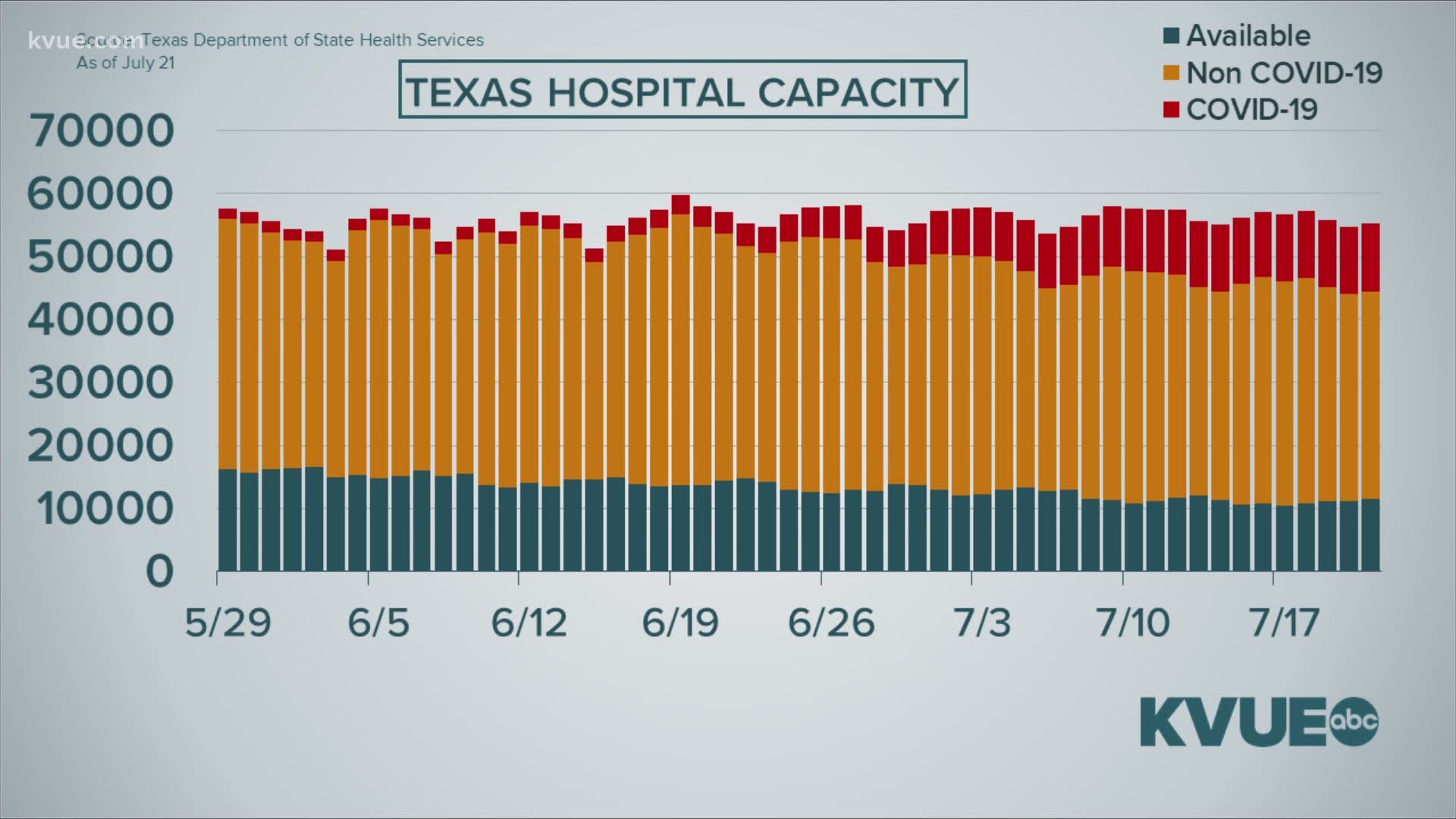AUSTIN, Texas — Adviser to Gov. Greg Abbott and the Supply Chain Strike Force, John Zerwas, M.D., joined KVUE's Ashley Goudeau to discuss hospital capacity and preparedness as Texas continues to battle COVID-19.
Ashley Goudeau: As the number of COVID-19 cases and hospitalizations continues to increase across the state of Texas, a lot of people are really having concerns about hospital capacity. Talk to us about where we stand across the state.
John Zerwas, M.D.: "Well, you know, this was an assessment we did back in March and April to determine what our hospital capacity need was, our capability was, and we found through the effort of Gov. Abbott when he put the prohibition on any elective procedures that there was very substantial capacity within our health care system. We went further to determine that if they actually went beyond what we call 'staffed capacity,' what additional amount of space could be created in order to take care of patients. And we found a very significant increase in the ability to take care of patients if we could provide the equipment and if we could provide the people there in order to take care of the patient. And so what we have found is that, again, it's different in different regions of the state, but in general, the state has done incredibly well. The health care system has done incredibly well in stepping up to the plate and providing the space to take care of COVID patients along with whatever the additional community needs are out there. And so we have to remember that in addition to COVID there's a lot of non-COVID disease in the communities out there that health care systems are ready to take care of. So people still have strokes. People still have cardiac conditions and things of that nature, urgent operations that need to be taken care of and stuff. But in general, we have done very well. The health care systems have been very resourceful in expanding their capacity when the need arose. And we've been very, very successful in finding and bringing in manpower from outside of the state in order to supplement the staffing needs that we have right now."
Goudeau: I want to talk a little bit more about that, because we've received a lot of messages from doctors and nurses here in the Austin area who say the hospitals here are starting to fill up, that, you know, the staff is becoming overworked and that there is a need for help here.
Zerwas: "And yes, and it's recognized; it has been seen that there is a need here. So in addition to just absolutely needing more people to take care of patients, what we're also realizing now is just the health care workforce fatigue and really a lot of the mental health concerns that are out there. And, you know, a lot of people can do a lot of work for a period of time. But at some point, we get what all of us recognize as battle fatigue. And so some of our workforce that we've brought in from outside of the state has been actually put in place to help give some relief to the people that have been at the front lines for quite some time. That's a very, very effective thing. It's very appreciated by the workforce that's here day in and day out and really doing the incredibly heavy lifting right now in terms of taking care of patients. So the workforce that we bring in has two functions. One is to expand the capability of the health care system, to surge into places within the hospital to provide additional care. And then the second would also be to provide that desperately needed relief out there for people that have been doing this day in and day out for extended shifts at a time."
Goudeau: You also work with the Supply Chain Strike Force. Talk to us a little bit about PPE, as well as equipment that's needed. Are we doing well in that area?
Zerwas: "We are. One of the first things that Gov. Abbott charged us with was to first preserve PPE, which was the reason for prohibiting any kind of elective procedures, you know in order to keep what we had. And then there was a very good effort that occurred as a consequence of the strike force, really solidifying our supply chain. Then this took a few weeks to actually create. That has continued to serve us very well and the supply chains by and large are in place. We aren't seeing desperate needs for PPE, although in any given part of the state, they may put in a request for masks, gowns, gloves, face shields, any number of things that they might be running a little bit lower on. And so we can get those to them in a pretty quick pace out there. The particular supply that we are running into right now that is a bit short is reagents for testing. And so when we run tests on different platforms, they require certain things called reagents in order to effectively run the test. We're finding those are in short supply across the state, and in fact, across the whole nation. And so, you know, we're working pretty hard to try to keep that supply in good shape so we can keep our testing capacity at a very high level."
PEOPLE ARE ALSO READING:

